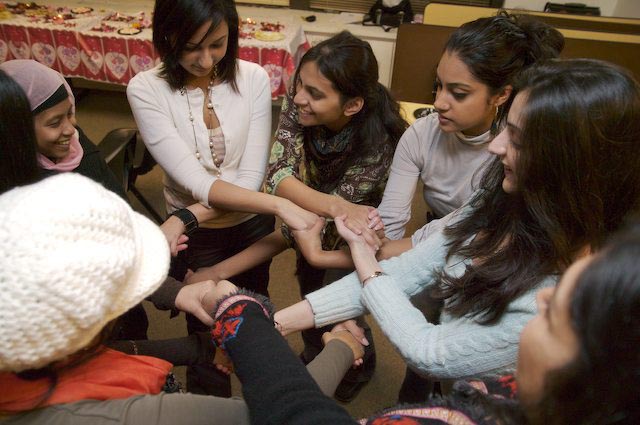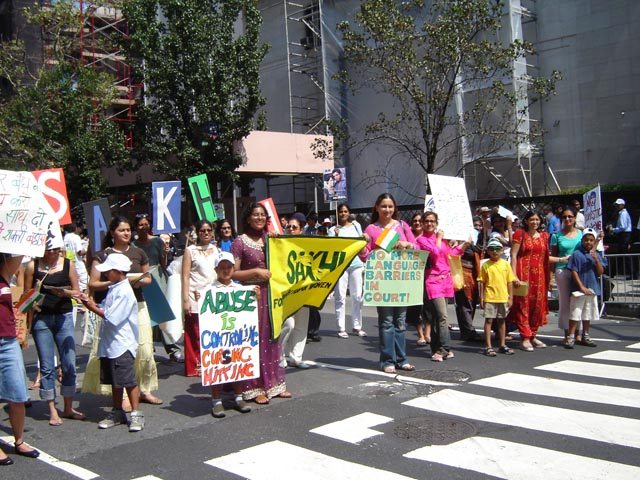CYBER-CIRCLES
For Indian immigrants who came to the US decades ago the most exciting encounter was – with another Indian! Their numbers were small and the circles of caring friends few. Now, as the community has grown, so have the circles. Here we are attempting to put all these countless circles into the clouds.
Now when a new migrant comes, the loneliness will be a thing of the past – for friends, community and cyber circles are just a mouse click away.
We invite you to use this piece of cyber real estate to let newcomers know about your organization, its benefits and its work.
Email details of your organization to cybercircles@ lassiwithlavina.com
SPOTLIGHT Sakhi for South Asian Women

Ragni Kidvai, a Sakhi volunteer, introduces you to this stellar organization which is ceebrated its 20th anniversary last year.
Both survivors of abuse and people who love them are realizing they do not have to live with abuse. communities.
Sakhi exists to end violence against women. Sakhi unites survivors, communities, and institutions to eradicate domestic violence and works to create strong and healthy communities. Sakhi uses an integrated approach that combines support and empowerment through service delivery, community engagement, media advocacy, and policy initiatives.
Founded in 1989 by a group of five South Asian women from diverse professional fields such as banking, film, law, and public health, Sakhi, meaning “woman friend,” was created to fill a critical need. In spite of an abundance of religious and cultural centers, professional associations, and ethnic-specific groups within New York’s large South Asian immigrant population, there was no place to address the silenced subject of domestic violence.
Today, Sakhi has grown and expanded its programming and impact far beyond its founding 20 years ago. Rana Quraishi, a board member, observes many of the first survivors were women who needed assistance in obtaining legal documents, such as passports. Rana notes, however, that now Sakhi receives “a whole range of calls. Some of the women who seek our services are what you would call ‘well-to-do,’ and they need Sakhi for confidence, services, or a referral.” Sakhi’s focus on empowerment has truly brought women together from all walks of life, Rana says.
From a helpline (212-868-6741) operating from 10 AM to 6 PM Monday through Friday, individualized crisis response and access to legal, medical, and shelter referrals as well as programming for emotional support and economic self-sufficiency, Sakhi provides survivors with a holistic package.
Reshma Patel remembers joining Sakhi as a volunteer back in 1994 when Sakhi was still relatively new. “I first volunteered for Sakhi by teaching survivors English. We have grown in so many ways since then. Now we not only offer English classes, but computer literacy classes as well,” says Reshma. “Women may come to us because of abuse, but they stay because of all our other services.”
Sakhi also works to reach out to the community at large, creating awareness of domestic violence through a community engagement and media program that includes a newsletter, an interactive website, short films, and a volunteer program. It also participates in forums, marches, panels, and other outreach events as expert presenters on violence against women.
Sakhi also works to create lasting systemic change. Due to the importance of language access for immigrant women and the inadequacy of interpretation services within the courts, Sakhi has worked to ensure adequate language access. Its efforts have even led to a court rule enabling access to an interpreter in civil and criminal cases in NY State.
Due to its multi-dimensional approach, Sakhi has been able to provide many survivors with the resources and ability to support themselves. “It is one thing to get out of an abusive relationship. It is another thing to be able to support yourself and your children afterwards,” says Reshma. Interestingly enough, many survivors go on to become Sakhi volunteers and donors. “It’s amazing how much of an impact Sakhi has made on the lives of so many women” adds Rana.

For more information go to: www.sakhi.org
